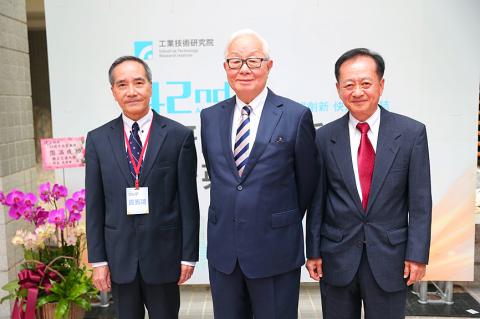Former Taiwan Semiconductor Manufacturing Co (TSMC, 台積電) joint chief operating officer Chiang Shang-yi (蔣尚義) is to take a job at Chinese rival Semiconductor Manufacturing International Corp (SMIC, 中芯國際), the Shanghai-based chipmaker said yesterday.
SMIC’s announcement ruffled feathers in local semiconductor circles, as Chiang is one of the key people who helped TSMC clinch top spot in the global semiconductor market through a slew of technological upgrades.
Chiang retired as vice president of TSMC’s research and development division in 2006, but he was “summoned” to rejoin the company in 2009 by TSMC chairman Morris Chang (張忠謀) to assist with the upgrades to 28-nanometer, 20-nanometer and 16-nanometer technologies.

Photo: Hung Yu-fang, Taipei Times
The advanced chips accounted for 55 percent of the chipmaker’s total revenue last quarter.
In 2013, Chiang, 70, retired again and was tapped as an adviser to Chang for the following two years. That role ended in December last year.
TSMC said that it was informed by Chiang in advance about his new position and that it does not expect it to adversely impact the company.
His position would be part of SMIC’s efforts to enhance its corporate governance and it is not linked to the chipmaker’s operations, TSMC said.
SMIC, the biggest contract chipmaker in China, has been struggling to implement advanced technologies and it lags behind TSMC by about three generations in terms of technology.
TSMC is planning to ship 10-nanometer chips in the first quarter next year, while SMIC is still relying on 28-nanometer chips.
SMIC’s revenue contribution from its 28-nanometer chips increased to 1.4 percent of its overall revenue last quarter, up from 0.1 percent the previous year, according to the company’s financial statement.
TSMC has a more than 70 percent share of the worldwide 28-nanometer chip market.
Chiang would be an independent non-executive director, the company said in a filing with Hong Kong Exchanges and Clearing Ltd.
Chiang does not hold any other position at SMIC or any of its subsidiaries, SMIC said in the filing.
Chiang led TSMC’s research and development as it set milestones in semiconductor technology, from legacy 0.25-micron chips to advanced 16-nanometer FinFET technologies, transforming TSMC from a technology follower to a technology leader, SMIC said.
Chiang is to receive annual cash compensation of US$40,000 and an option to subscribe for 187,500 SMIC ordinary shares, the company said.
TSMC shares fell 1.37 percent to close at NT$180 in Taipei trading yesterday, while SMIC shares slipped 0.76 percent in Hong Kong trading.

The US government has signed defense cooperation agreements with Japan and the Philippines to boost the deterrence capabilities of countries in the first island chain, a report by the National Security Bureau (NSB) showed. The main countries on the first island chain include the two nations and Taiwan. The bureau is to present the report at a meeting of the legislature’s Foreign Affairs and National Defense Committee tomorrow. The US military has deployed Typhon missile systems to Japan’s Yamaguchi Prefecture and Zambales province in the Philippines during their joint military exercises. It has also installed NMESIS anti-ship systems in Japan’s Okinawa

TRAGEDY STRIKES TAIPEI: The suspect died after falling off a building after he threw smoke grenades into Taipei Main Station and went on a killing spree in Zhongshan A 27-year-old suspect allegedly threw smoke grenades in Taipei Main Station and then proceeded to Zhongshan MRT Station in a random killing spree that resulted in the death of the suspect and two other civilians, and seven injured, including one in critical condition, as of press time last night. The suspect, identified as a man surnamed Chang Wen (張文), allegedly began the attack at Taipei Main Station, the Taipei Fire Department said, adding that it received a report at 5:24pm that smoke grenades had been thrown in the station. One man in his 50s was rushed to hospital after a cardiac arrest

PUBLIC SAFETY: The premier said that security would be tightened in transport hubs, while President Lai commended the public for their bravery The government is to deploy more police, including rapid response units, in crowded public areas to ensure a swift response to any threats, President William Lai (賴清德) said yesterday after a knife attack killed three people and injured 11 in Taipei the previous day. Lai made the remarks following a briefing by the National Police Agency on the progress of the investigation, saying that the attack underscored the importance of cooperation in public security between the central and local governments. The attack unfolded in the early evening on Friday around Taipei Main Station’s M7 exit and later near the Taipei MRT’s Zhongshan

ON ALERT: Taiwan’s partners would issue warnings if China attempted to use Interpol to target Taiwanese, and the global body has mechanisms to prevent it, an official said China has stationed two to four people specializing in Taiwan affairs at its embassies in several democratic countries to monitor and harass Taiwanese, actions that the host nations would not tolerate, National Security Bureau (NSB) Director-General Tsai Ming-yen (蔡明彥) said yesterday. Tsai made the comments at a meeting of the legislature’s Foreign Affairs and National Defense Committee, which asked him and Minister of National Defense Wellington Koo (顧立雄) to report on potential conflicts in the Taiwan Strait and military preparedness. Democratic Progressive Party (DPP) Legislator Michelle Lin (林楚茵) expressed concern that Beijing has posted personnel from China’s Taiwan Affairs Office to its